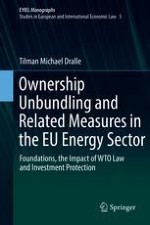2018 | OriginalPaper | Chapter
2. The Unbundling and Unbundling-Related Measures in the EU Energy Sector
Author : Tilman Michael Dralle
Published in: Ownership Unbundling and Related Measures in the EU Energy Sector
Publisher: Springer International Publishing
Activate our intelligent search to find suitable subject content or patents.
Select sections of text to find matching patents with Artificial Intelligence. powered by
Select sections of text to find additional relevant content using AI-assisted search. powered by
